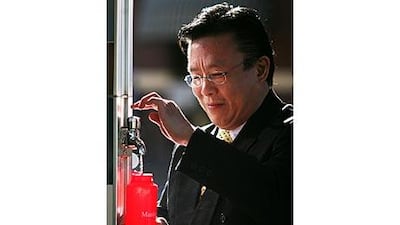SYDNEY // A small outback town in Australia has become the first in the country to outlaw the sale of bottled water, prompting authorities elsewhere to consider similar moves. Environmental worries have been the driving force behind the radical decision by the people of Bundanoon in New South Wales, who believe that water sold in plastic bottles is a luxury they no longer need. Residents have expressed deep reservations about the amounts of energy and natural resources that are needed to extract, process, package and distribute mineral water when what comes out of the tap is perfectly safe and drinkable.
At a packed town hall assembly, the ban was overwhelmingly endorsed by a show of hands. "We held a vote at the end of that meeting and we had all in favour bar one, so it was a pretty strong mandate," said Huw Kingston, one of the scheme's founders. Mr Kingston runs a bike shop and cafe in Bundanoon, which is about 161km south-west of Sydney and is home to 2,500 people. Visitors to this picturesque community that sits on the edge of the Moreton National Park will not, however, go thirsty as new water fountains will be dotted throughout the town.
"The key point is we are making water more available than ever before in Bundanoon," said Mr Kingston. "We are installing some beautiful, modern water stations on the main street and also in the school. "Filtered Bundanoon tap water will be freely available on the street and in the businesses themselves, they'll sell refillable bottles." The campaign started when a water company announced plans to build a plant in Bundanoon to tap into plentiful supplies in a nearby aquifer.
While a court is to decide whether the development can proceed, for locals the equation remains simple and unpalatable; outsiders want to exploit their water, transport it to Sydney for processing and then sell it back to them in fancy packaging at a healthy profit. It was from there that the backlash against the drinks industry by residents intensified, which has culminated in the ground-breaking prohibition on the sale of mineral water. The ban is not mandatory but it has the backing of every business in Bundanoon.
Australia's beverage sector said it was disappointed with the decision, insisting that consumer choice would be limited as a result. What began as a trickle of discontent in one small community is developing into a growing wave of dissatisfaction across Australia. Other local authorities are now considering taking similar steps to those taken in Bundanoon, while the New South Wales state government has ordered its departments not to buy water sold in plastic bottles.
However, Australians have a taste for bottled water, spending about AUD$500 million (Dh1.47bn) in 2008, a 10 per cent increase on the previous year. In Manly, a beach suburb of Sydney, officials are trying to convince locals and tourists to drink free filtered water instead, as part of a plan to reduce carbon emissions from the production of the more expensive variety sold in shops. "The council's attitude is simple and that is providing alternatives to bottled water that are clean, safe and free. We believe people do make that choice deliberately," said Henry Wong, the general manager at Manly Council, which has installed six water dispensers in the main shopping precinct and has plans to add a further 10 along the beachfront. Each fountain costs about AUD$5,000, while commercial sponsorship covers maintenance and cleaning.
"We are pleased to see people switching from bottled water to filtered water that we provide. However, we are looking at a massive campaign to change people's attitudes," Mr Wong said. "We did go through a period of nervousness when we had the escalation of the swine flu situation, so we came through with greater experience to manage these services better," he said. Mr Wong conceded that a Bundanoon-style ban would be impossible to introduce in an area such as Manly, which has more than 400 cafes, restaurants and shops, and attracts millions of visitors every year . However, the local authority is keen to make a contribution to help the environment.
"We are happy to convince everyone that bottled water should be used as a last resort," said Mr Wong. Some in Australia's drinks industry believe that it must do more to adapt to the growing environmental concerns of customers. "We do as much as we can when we say 'eco-friendly'. We offset all our carbon emissions on a yearly basis, we recycle all our material and we have cut down our energy consumption by about 50 per cent at the springs. The bottles that we use are 100 per cent recyclable and we are also researching a 100 per cent biodegradable bottle," said Ajanta Willert, managing director of Good Vibes To You, a company that sells mineral water.
"Bottled water is great because it does give people the healthy option. There are so many sugary drinks in front of them. It's important to have choice in the market," Ms Willert said. @Email:pmercer@thenational.ae

